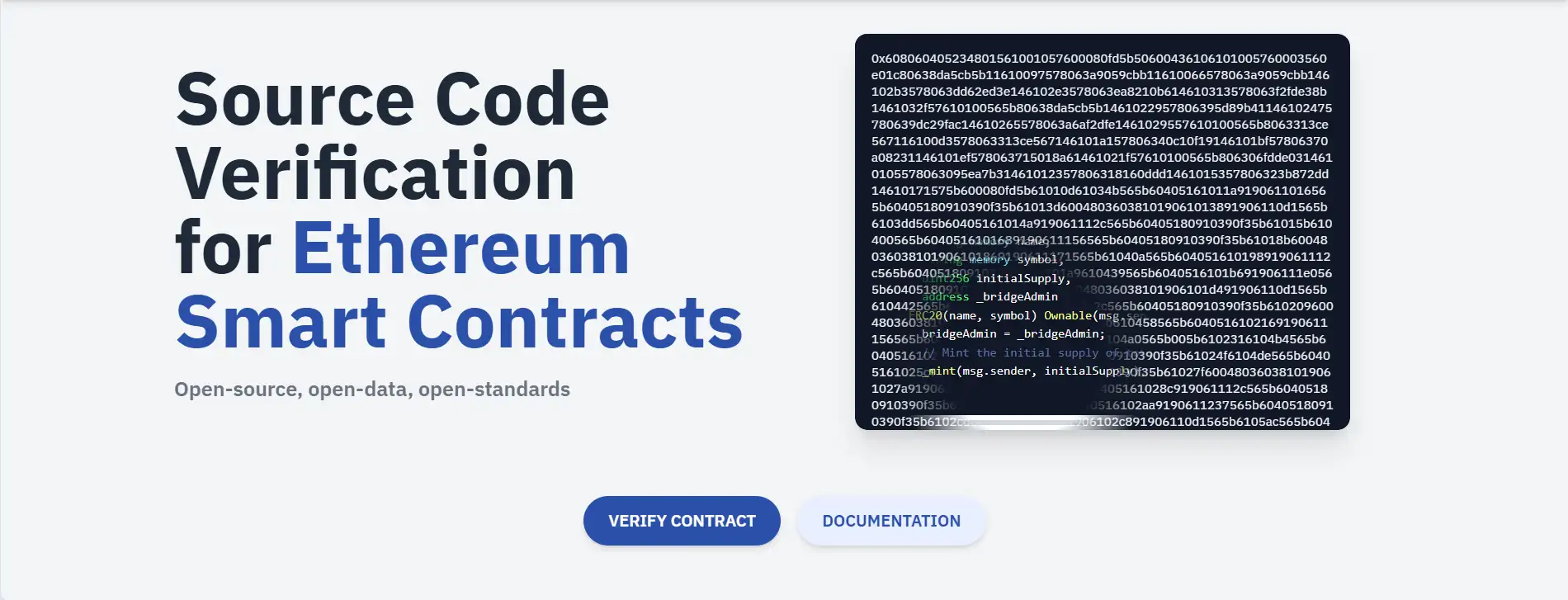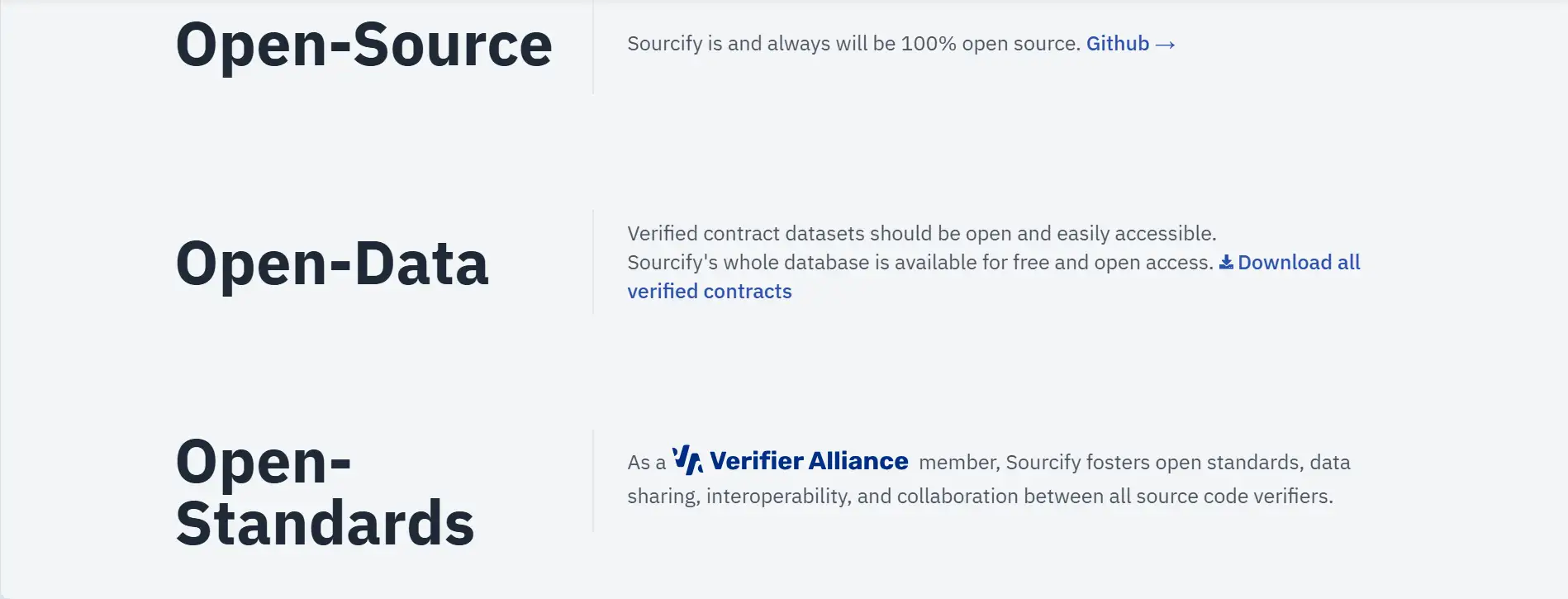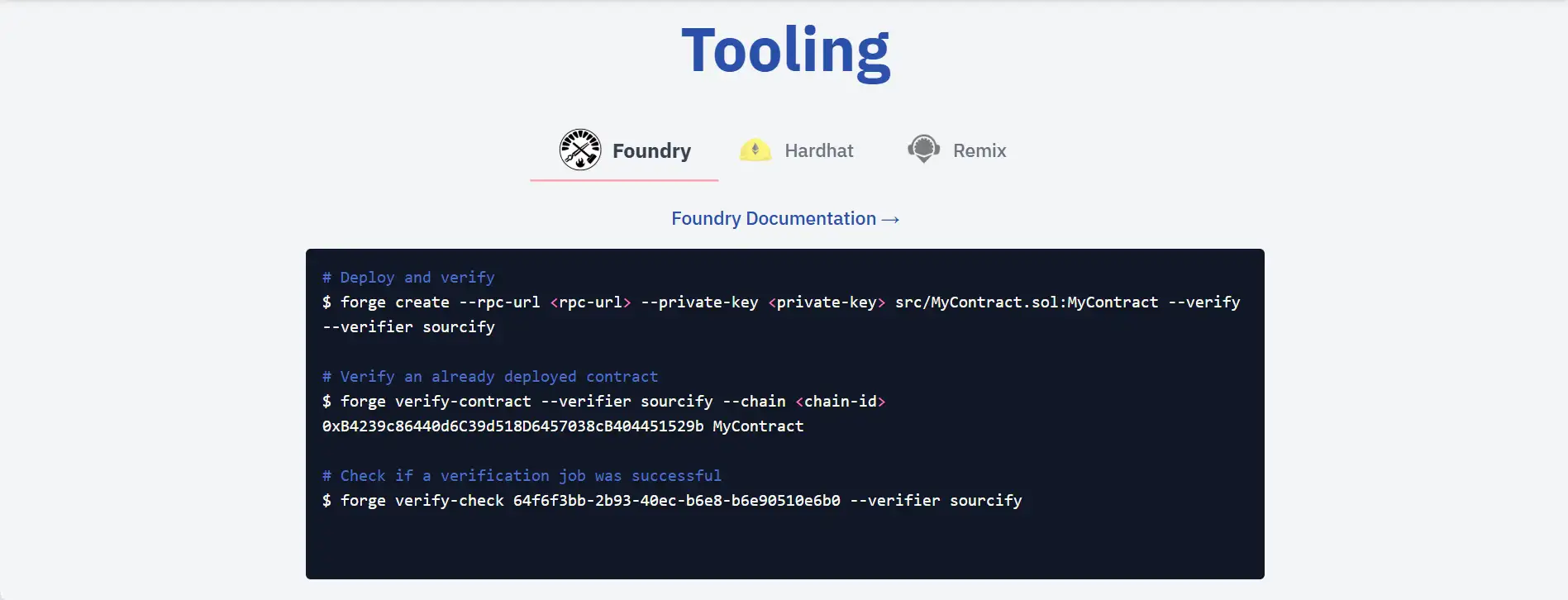About Sourcify
Sourcify is a decentralized, open-source smart contract verification service built for the Ethereum ecosystem and compatible with all EVM-based chains. By leveraging Solidity’s metadata and CBOR encoding, it enables complete, reproducible, and reliable verification of deployed smart contracts. Unlike proprietary platforms, Sourcify emphasizes transparency, collaboration, and open standards across all aspects of its infrastructure.
As a core initiative of the Argot Collective, Sourcify empowers developers, auditors, and end users by making verified smart contract data universally accessible. Through tools such as its HTTP server, PostgreSQL database, auto-verification monitor, and public repository, Sourcify strengthens security, enables auditability, and enhances trust in the decentralized web.
Sourcify was developed to solve a fundamental challenge in the Ethereum ecosystem—ensuring the trustworthiness and auditability of deployed smart contracts. As more contracts are deployed on-chain, it's vital for users to know that the bytecode they interact with genuinely reflects the source code developers have published. Sourcify addresses this by enabling fully automated and verifiable smart contract matching using standardized metadata from Solidity and Vyper compilers.
At its core, Sourcify consists of several critical components. The sourcify-server acts as an HTTP gateway for contract verification, while the sourcify-database stores metadata and verified contracts across more than 180 EVM chains including Ethereum, Polygon, Arbitrum, Optimism, BNB Chain, Base, Gnosis, Linea, and many others. Additionally, the sourcify-monitor listens for new contract deployments on supported chains and automatically attempts verification if metadata is published to IPFS.
The platform is entirely open-source and free to use. Developers can use the UI to submit contracts, look up deployed addresses, or browse verified contracts via the Sourcify Contract Repository. For power users and auditors, Sourcify offers integration with CLI tools like Foundry, Hardhat, and Remix. This allows seamless deployment, verification, and integration into custom workflows.
While verification tools exist within platforms like Etherscan and BscScan, Sourcify is unique in its open-data approach. All verified contracts are stored publicly and accessible for download, unlike centralized explorers that restrict or obfuscate contract sources. In this way, Sourcify competes not just with tools but with closed ecosystems that limit auditability and reusability of smart contract data.
As a member of the Verifier Alliance, Sourcify promotes cross-platform collaboration and standardization. Its commitment to open innovation, combined with self-hosting capabilities, makes it a vital tool for Web3 developers and researchers aiming to build secure, verifiable decentralized applications at scale.
Sourcify offers robust features that make it an essential tool for smart contract verification and blockchain transparency:
- Fully Open-Source: Licensed under MIT, Sourcify is transparent, freely accessible, and community-driven.
- Support for Multiple Languages: Compatible with Solidity and Vyper, offering broad support for EVM developers.
- Automatic Matching: Monitors EVM chains and auto-verifies contracts if their metadata is published on IPFS.
- Massive Multi-Chain Support: Supports over 180 EVM-compatible networks, including Ethereum Mainnet, Arbitrum, Optimism, BNB Chain, Base, Polygon, and more.
- Public Repository: All verified contracts are published in an open, browsable repository at repo.sourcify.dev.
- Tooling Integration: Native support for Foundry, Hardhat, and Remix makes it easy to integrate verification into your development pipeline.
- Data Playground: Developers can query verified contract metadata using SQL via BigQuery, enabling blockchain research and analytics.
- Self-Hosting Friendly: Run your own Sourcify instance for custom infrastructure needs or privacy-focused applications.
- Verifier Alliance Collaboration: Actively working with other projects to create shared standards and foster interoperability.
Sourcify offers multiple entry points to start verifying contracts or explore verified data, all through a developer-friendly experience:
- Visit the Site: Go to sourcify.dev to access the main interface and documentation.
- Verify a Contract: Use the Verify tab to upload your Solidity or Vyper source code and metadata. Sourcify will perform source code matching automatically.
- Lookup a Contract: Input any deployed address under the Lookup tab to find verified source code and ABI data.
- Explore Verified Contracts: Browse the public repository at repo.sourcify.dev to explore over 1.3 million verified contracts.
-
Use CLI Tooling: Integrate verification using Foundry or Hardhat commands like:
$ forge verify-contract --verifier sourcify --chain <chain-id> <contract-address> - Analyze with BigQuery: Use the Playground to run SQL queries against the full verification dataset.
- Join the Community: Connect on X (Twitter) to get help or contribute.
Sourcify FAQ
A fully verified contract on Sourcify means that the contract’s deployed bytecode perfectly matches the recompiled bytecode from its source code and metadata. This ensures the contract’s logic hasn’t been altered post-compilation and the source files used for verification are genuine. Full verification allows users, auditors, and explorers to trust the integrity of the code on-chain, reducing the risk of interacting with malicious or manipulated contracts.
Sourcify uses a service called the sourcify-monitor, which listens to supported EVM-compatible chains for new contract deployments. When a contract is created, it checks for corresponding metadata published on IPFS. If found, it triggers an automatic verification process via the Sourcify API. This makes Sourcify proactive in contract indexing and significantly reduces manual intervention, helping maintain a real-time stream of verified deployments across 180+ chains.
Open metadata allows anyone to inspect how a contract was built, which compiler version was used, what optimizations were applied, and more. By keeping this data freely available, Sourcify ensures developers and auditors can reproduce the bytecode and confirm its authenticity. This eliminates trust in centralized verification tools and fosters verifiability, reproducibility, and accountability—critical for building a secure decentralized ecosystem.
Yes, Sourcify is designed with self-hosting in mind. Its components—including the server, database, and monitoring services—are all open-source and modular. Enterprises and development teams can deploy their own internal Sourcify instance to verify internal contracts, maintain private repositories, or create custom verification workflows. Full documentation and setup guides are available in the official documentation.
Sourcify supports direct integration with CLI tools such as Foundry and Hardhat. Developers can use commands like
forge verify-contractor Hardhat’s plugins to verify deployed contracts seamlessly via the Sourcify verifier. This makes it easy to add Sourcify verification as a step in your deployment scripts, CI/CD pipelines, or local testing environments—streamlining transparency without extra complexity.
You Might Also Like












